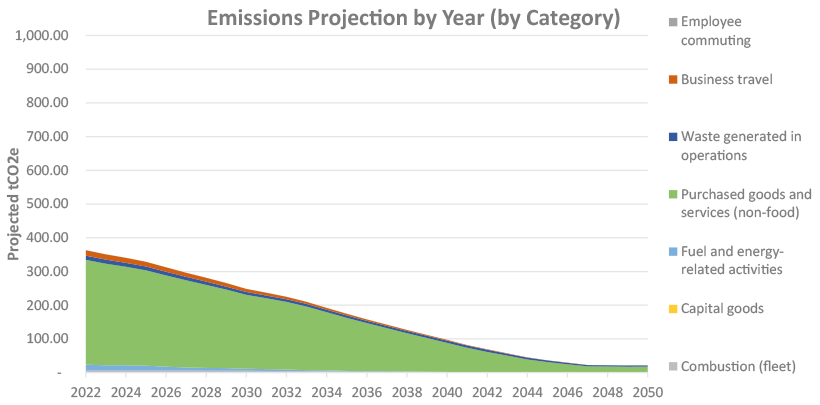Carbon Reduction Plan
Committed to Achieving Net Zero

Commitment to Achieving Net Zero
TCN aims to align business values, purpose and strategy with the needs of customers while embedding responsible and ethical principles into everything the business does. We partnered with Energise Consulting Ltd, to assess our carbon emissions and to define our carbon reduction plan. Total Computers Network (TCN) supports the UK government’s goal of achieving Net Zero emissions by 2050, and we are committed to achieving net zero across all scopes by 2050 at the latest.
Baseline Emissions Footprint
Baseline emissions are a record of the greenhouse gases that have been produced in the past and were produced prior to the introduction of any strategies to reduce emissions. Baseline emissions are the reference point against which emissions reduction can be measured.
Baseline year: 2019
Additional Details relating to the Baseline Emissions calculations.
Methodology:
Our emissions have been calculated using the GHG Protocol Corporate Accounting and Reporting Standard (revised edition), together with the latest emission factors from DEFRA. The GHG protocol corporate accounting and reporting standard provides requirements and guidance for companies and other organisations preparing a corporate level GHG emissions inventory.
The data detailed in the table represents energy use and emissions for which the company is responsible for the years ending 31st December 2019 (the baseline year) and 2023 (current year). This includes:
The GHG Protocol splits emissions into three scopes:
1.
Scope 1: Direct emissions from combustion of fuels such as heating & hot water within our offices & warehouse and emissions from the fuel used in our company vehicles.
2.
Scope 2: Indirect (Market Based) Emissions covering our office and warehouse electricity consumption.
3.
Scope 3: Indirect emissions from our operations split into upstream and downstream emissions, waste generated in operations, business travel, employee commuting and distribution.
Baseline Emissions Footprint: 2019
The data detailed within the tables below represents energy use and emissions for which TCN are responsible for the years ending 31st December 2019 (the baseline year) and 2023 (current year).
Baseline Emissions Footprint
| Reporting Year : 2019 | |
|---|---|
| Emissions | Total (tCO2e) |
| Scope 1 | 28.8 |
| Scope 2 | 14 |
| Scope 3 | 548 |
| Scope 3 Category & Breakdown | |
| Upstream Transport & Distribution | 167 |
| Employee Commuting | 128 |
| Waste generated in operations | 75 |
| Business Travel | 54 |
| Downstream Transport & Distribution | 124 |
| Total Emissions | 599 |
Current Emissions Reporting
| Reporting Year : 2023 | |
|---|---|
| Emissions | Total (tCO2e) |
| Scope 1 | 4 |
| Scope 2 | 0* |
| Scope 3 | 710 |
| Scope 3 Category & Breakdown | |
| Upstream Transport & Distribution | 126 |
| Employee Commuting | 231 |
| Waste generated in operations | 0.5 |
| Business Travel | 121 |
| Downstream Transport and Distribution | 231 |
| Total Emissions | 714 |
*Market-Based emissions relate to electricity supplier-specific emissions (location-based are electricity emissions based on the UK’s average grid mix). Where TCN use a 100% renewable electricity supplier, from a market-based perspective, our Scope 2 emissions are zero.
Emissions Reduction Targets
In order to continue our progress to achieving Net Zero, we adopted the following carbon reduction target in 2021. To be net zero by 2050 at the latest.
We projected that carbon emissions will decrease over the next five years to 174.32 (37%) tCO2e by 2027, as seen in the graph below.

At the end of January 2024, Boxxe acquired Total Computers. Total Computers will continue to trade independently before being integrated into boxxe during the course of 2024. We will assess the GHG emissions impact of Total Network Computers integrating with boxxe and develop a group decarbonisation strategy in line with the Science Based Targets initiative (SBTi) 1.5-degree temperature pathway framework and reconfirm the projected reductions.
Carbon Reduction Initiatives
Completed carbon reduction initiatives:
Certifications and Accreditations
We maintain an accredited ISO 14001:2015 Environmental Management System covering the entire scope of our business.
Employee Commuting and Business Travel
Our people are encouraged to share vehicles or use public transport for commuting and business travel. This is enabled through the use of virtual technology to reduce the need for business meetings. We are in the process of decarbonising our company fleet and transition to hybrid & fully electric vehicles.
Circular IT and Facilities
Where possible, we offer our customers refurbished IT products, or products made from recycled/recyclable materials, and products that have a low-energy consumption. We also utilize buy-back offers on their current IT estate to be sent for recycling/refurbishing. TCN also offer several disposal services to customers for any broken or redundant equipment they may have and do so in accordance with WEEE regulations. TCN are committed to the Governments sustainable technology strategy 2020 in a way that minimises our emissions and potential impact on the environment whilst providing quality solutions and services to our customers. We also consider this for own operations when procuring products, including IT Hardware, lighting & paper.
Logistics
We utilise logistics providers that are transitioning to lower emissions vehicles. We decant hardware from any excess packaging so that we can fit more devices on a pallet, therefore increasing the number of devices/orders we can fit into one delivery van. This also ensures the excess materials are disposed of responsibly.
Monitoring our Supply Chain
TCN operate an Environmental Policy built upon ISO 14001 principles and as part of our supply chain quality management process, TCN requests that all vendors, subcontractors and third parties that we work with have a Carbon Reduction Plan (CRP), environmental & sustainability policies and that they adhere to and can provide evidence.
We work with Tier 1 manufacturers who proactively redesign their products with sustainability and energy efficiency in mind. These products are offered to our customers as they typically hold the ENERGY STAR certification which not only has the opportunity to reduce energy consumption but also considers environmental sustainability during the manufacturing process.
An example of some of our partners and their environmental & sustainability projects that our inline with our own goals can be found below:






Our carbon reduction assessment forecasted that if a combination of the proposed energy efficiency actions are taken, projected savings will amount to a percentage reduction in Scope 1 of about 0.44% and Scope 2 of about 25.83% against the 2019 baseline year.
In the future we hope to implement further measures including, but not limited to:
- Continue to decarbonise our company fleet and transition to hybrid & fully electric vehicles.
- Prioritise working with partners and vendors whose carbon reduction & environmental strategies align with our own.
- Work with our supply chain & distributors to improve the accuracy of our Scope 3 Upstream and Downstream Transport & Distribution reporting to allow us to better reduce this.
Following acquisition and planned integration of Total Computers into boxxe our greenhouse gas emissions and carbon reduction plan will be reviewed in line with the Science Based Targets initiative (SBTi) 1.5-degree temperature pathway framework, and we will reconfirm the projected reductions.
Declaration & Sign-Off
This Carbon Reduction Plan has been completed in accordance with PPN 06/21 and associated guidance and reporting standard for Carbon Reduction Plans.
Emissions have been reported and recorded in accordance with the published reporting standard for Carbon Reduction Plans and the GHG Reporting Protocol corporate standard and uses the appropriate Government emission conversion factors for greenhouse gas company reporting.
Scope 1 and Scope 2 emissions have been reported in accordance with SECR requirements, and the required subset of Scope 3 emissions have been reported in accordance with the published reporting standard for Carbon Reduction Plans and the Corporate Value Chain (Scope 3) Standard. This Carbon Reduction Plan has been reviewed and signed off by the board of directors (or equivalent management body).
Signed on behalf of Total Computer Networks Limited
Phil Doye, CEO
17/04/2024

